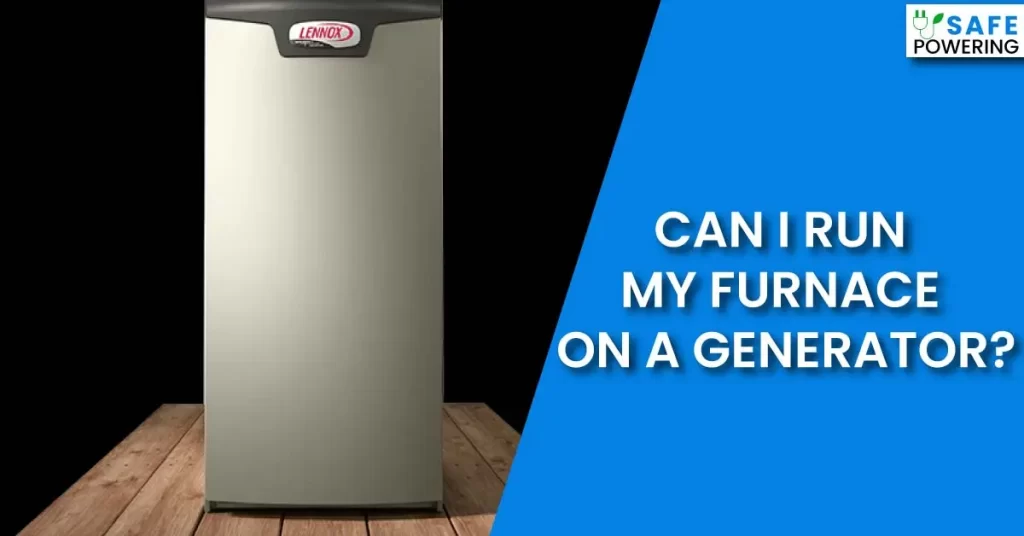Can I Run my Furnace On A Generator – What Size is Required?
Selecting the right size generator to run your furnace during a power outage is crucial to ensure that your furnace remains operational without any damage.
To determine the appropriate generator size, you must know your furnace’s power requirements, including its starting wattage, and any other appliances you intend to power simultaneously.
This information can usually be found in the owner’s manual or by contacting the manufacturer.
Once you have this information, you can select a generator with a wattage rating that is at least equal to your furnace’s power requirement.

Can I Run my Furnace On A Generator?
Typically, gas furnaces with smaller blower fans, control boards, and inducer motors can typically be powered with a generator that has a starting wattage of 1800 to 2000 watts. However, larger electric furnaces with 8KW or 10KW heating elements will require a generator with a higher wattage capacity of at least 12KW to 13KW to cover the starting watts.
A gas furnace only needs a draft blower fan, control board, and induced motor whereas an electric fan needs the power to run the entire unit.
How Many Watts Does a Furnace Use?
The wattage required by a furnace depends on various factors such as the type, size, and age of the furnace, as well as the specific components it uses.
Generally, gas furnaces with smaller blower fans, control boards, and inducer motors require around 300 to 700 watts to operate continuously.
In contrast, electric furnaces with 8KW or 10KW heating elements can consume 8,000 to 10,000 watts or more, depending on their size and specific components.
It’s important to note that furnaces also require a surge of power, known as starting watts, to get them started.
This surge of power can be several times higher than the furnace’s continuous operating watts.
Gas furnaces with smaller blowers and components typically require around 1000 to 1200 starting watts, while electric furnaces with 8KW or 10KW heating elements require around 8,000 to 10,000 starting watts.
The easiest and simplest way to check the furnace’s power requirement is to check the user manual.
Suppose the manual says your furnace draws 22amp at 240V. Then the formula to calculate the watts is:
WATTS = AMPS x VOLTS
WATTS = 22A X 240V
WATTS = 5280
| Furnace Type | Starting Watts | Running Watts | Watt-Hour |
| Gas furnace with small blower fan | 300-700 | 300-700 | 0.3-0.7 kWh |
| Gas furnace with larger blower fan | 1000-1200 | 350-400 | 0.4 kWh |
| Gas furnace with inducer motor | 300-700 | 300-700 | 0.3-0.7 kWh |
| Electric furnace with 8KW heating element | 8,000-10,000 | 8,000-10,000 | 8-10 kWh |
| Electric furnace with 10KW heating element | 8,000-10,000 | 8,000-10,000 | 8-10 kWh |
To be even more precise, we need separate and accurate calculations for the gas and electric furnaces because one only needs the power to run a few of its components, while the other runs entirely on electricity.
Let’s talk about starting and running watts of the Blower Fan first.
Starting and Running Watts of Blower Fan
| Fan Size | Starting Watts | Running Watts | Watt-Hour |
| 1/8 HP (0.125) | 600-700 | 100-150 | 0.1 kWh |
| 1/6 HP (0.1667) | 800-900 | 200-250 | 0.2 kWh |
| 1/4 HP (0.25) | 1100-1200 | 350-400 | 0.4 kWh |
| 1/3 HP (0.33) | 1700-1800 | 550-600 | 0.6 kWh |
| 1/2 HP (0.5) | 2300-2400 | 750-800 | 0.8 kWh |
| 3/4 HP (0.75) | 3200-3300 | 1050-1100 | 1.1 kWh |
| 1 HP | 4700-4800 | 1500-1600 | 1.6 kWh |
What Size Generator is Required for a Gas Furnace?
The blower draft fan is the component that requires most of a mount in a gas furnace by the inducer fan and control board as I have already mentioned above.
Other small things like igniters, lights, and sensors also require a bit of power. Let me give an example.
Q1. A gas furnace with a larger blower fan requires 1000 starting watts and 350 running watts. The furnace also has a control board that requires an additional 50 watts to operate. What size generator would be required to power this furnace?
Answer: Blower starting watts + blower running watts = 1000 + 350 = 1350
Add the power required by the control board to the total = 1350 + 50 = 1400
You would need a generator with at least 1400 watts to power this gas furnace with a larger blower fan and control board.
A 2000W generator will run your gas furnace and some other light equipment.
| Generator Size | Blower Fan Size |
| 1800-2000 watts | 1/8 (0.125) HP |
| 2000-2500 watts | 1/6 (0.1667) HP |
| 2500-3000 watts | 1/4 (0.25) HP |
| 3500-4000 watts | 1/3 (0.33) HP |
| 5000-6000 watts | 1/2 (0.5) HP |
| 6500-8000 watts | 3/4 (0.75) HP |
| 12,000 watts or higher | 1 HP or larger |
You can also read this gas furnace energy consumption research to increase your knowledge on the subject.
What Size Generator to Run an Electric Furnace?
When it comes to electric furnaces, every component requires electricity to operate.
From the heating element and blower fan to the transformer, control board, and other electronics, each part plays a crucial role in ensuring that the furnace functions properly.
To determine how many watts your electric furnace requires, you’ll need to consult the manual.
The manual should provide information on the heating element’s wattage.
Unlike a blower fan, the heating element doesn’t require starting watts because it doesn’t have a motor.
However, the blower fan does require starting watts, so it’s essential to factor that in when calculating the overall wattage requirements for your furnace.
Let me give you an example:
Q2. Suppose you have an electric furnace with a heating element that requires 8KW to operate and a blower fan that requires 800 starting watts and 400 running watts. What generator size would you need to run this electric furnace?
Answer: Starting watts of blower fan + running watts = 800 + 400 = 1200
Add the total to the heating element power requirement = 1200 + 8000 = 9200 watts.
You would need a 9200 to 10000-watt generator to run your electric furnace.
Learn what else can a 10000W generator run along with a furnace.
| Electric Furnace (20KW) Generator Size | Blower Fan |
| 22000 watt | ¼ (0.25) HP |
| 23000 watt | 1/3 (0.33) HP |
| 24000 watt | ½ (0.5) HP |
| 27000 to 28000 watt | 1 HP |
This energy-saving research on gas furnaces will certainly increase your knowledge on the topic just like gas furnace research.
Why Inverter Generators Are Preferred for Furnaces?
Inverter generators are preferred for furnaces because they produce stable and clean power.
The power produced by conventional generators may fluctuate, causing damage to sensitive electronics like furnace control boards.
On the other hand, inverter generators use advanced electronics to generate stable and clean power with little to no harmonic distortion that is safe for sensitive electronics.
Inverter generators are also highly efficient and consume less fuel than conventional generators.
They adjust the engine speed according to the load, so the engine only produces the necessary amount of power, resulting in lower fuel consumption and quieter operation.
Some of the great inverter generators are Honda EU2200Is, Champion 2000W, and Westinghouse 2000W.
Will a Generator Damage my Furnace?
A generator will not damage your furnace if you use it properly and choose the right size of generator for your furnace.
However, if you choose a generator that is too small or too large, it can cause damage to your furnace.
A generator that is too small may cause your furnace to work harder than it should, which can lead to overheating and damage.
On the other hand, a generator that is too large can cause a power surge when it starts up, which can damage the electrical components of your furnace.

Fareed, the highly skilled electrical expert, boasts 5 years of extensive experience in proficiently maintaining, repairing, diagnosing, and installing a diverse range of electrical systems.
